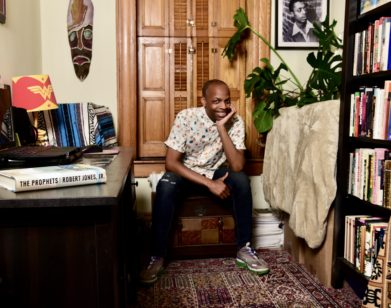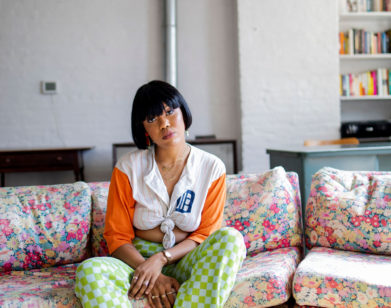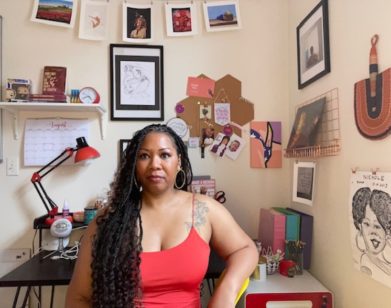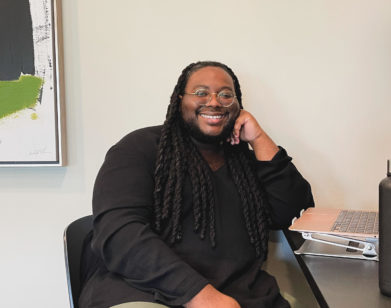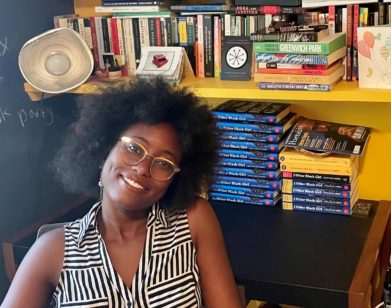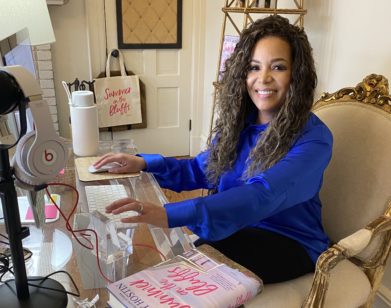Toni Morrison’s Haunting Resonance
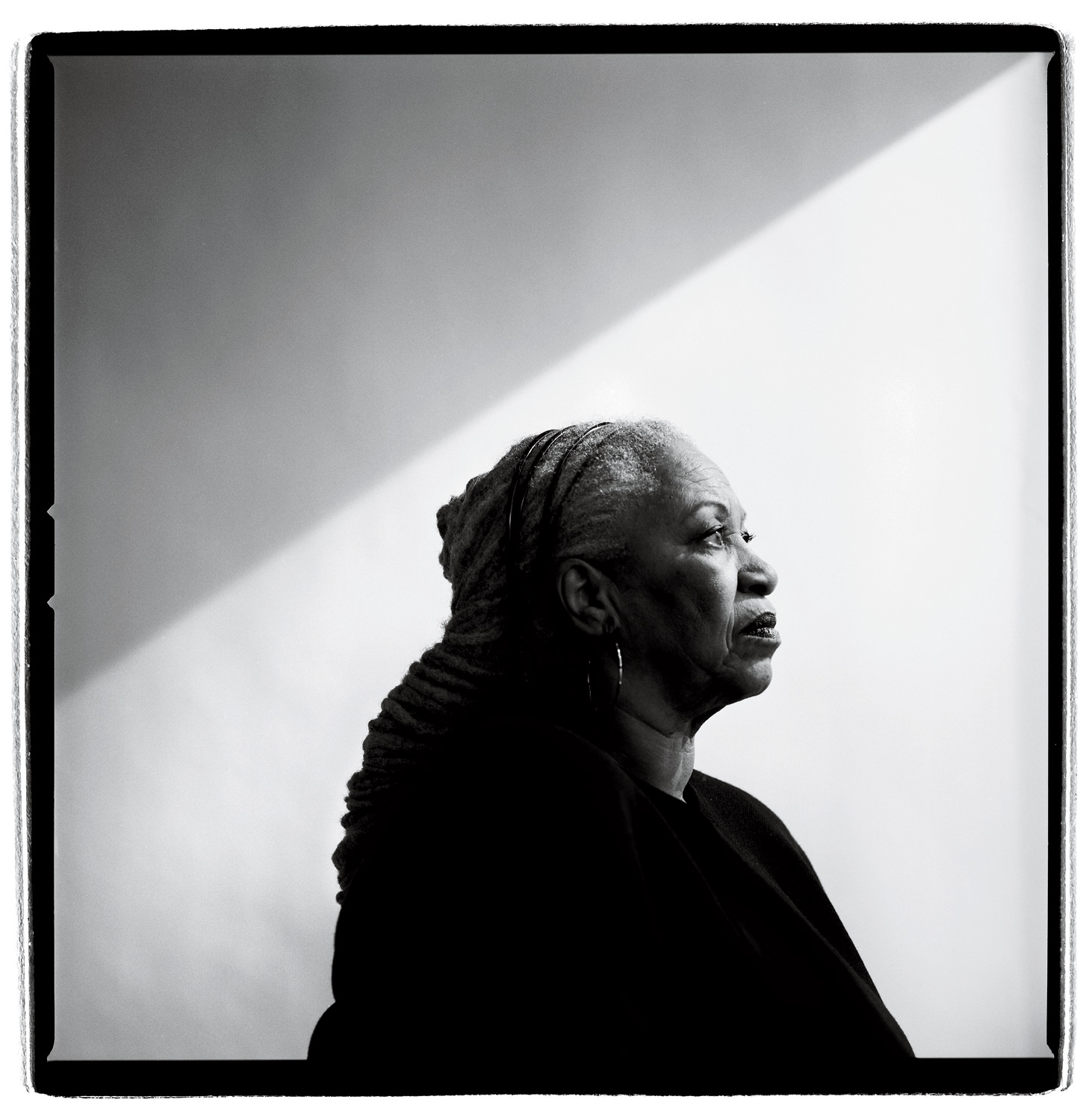 “If you took the gaze of the white male— or even the white female, but certainly the male— out of the world, it was freedom! You could think anything, go anywhere, imagine anything . . . there was no longer the problem of looking through the master’s gaze.” — Toni Morrison
“If you took the gaze of the white male— or even the white female, but certainly the male— out of the world, it was freedom! You could think anything, go anywhere, imagine anything . . . there was no longer the problem of looking through the master’s gaze.” — Toni Morrison
———
We are unaccustomed to artistic or social revolutionaries receiving high honors during their lifetimes. Usually, America’s regard for its cultural innovators is, at best, a backward glance. Thus the legion of prizes that have been bestowed upon Toni Morrison might lead one to suspect that she chronicles the preferred version of American events rather than the darker, harder stories of who we are. Among the awards received by the 81-year-old writer from Lorain, Ohio, are the 1988 Pulitzer Prize, and, in 1993, she was the first black woman to receive the Nobel Prize in Literature. Moreover, the breathless veneration put forth by her fans— who include Barack Obama and Oprah Winfrey— might indicate that Morrison is too mired in the establishment for her novels to provoke or critique. All of these assumptions are dead wrong. The author’s journey through the literary landscape has always been one of defiance. Ever since her first novel, The Bluest Eye, was published in 1970, when the then 39-year-old Morrison was a single mother living in Queens raising two boys and working as a senior editor at Random House, her fiction has remained both unflinchingly visceral and almost biblical in proportion. Her language can be spare, but every color, description, and emotional or collective massacre has a haunting resonance.
It goes without saying that Morrison’s literature tackles the national themes of racism and sexism, but her work also resists many of the pervasive liberal dogmas of her time, particularly the black movement’s interest in only presenting positive portrayals of black characters and second-wave feminism’s tendency to diminish the significance of motherhood—that topic being a clear set piece of her 1987 masterwork Beloved.
It is one kind of bravery to refuse to write under the paradigm of the white-master narrative, but it is quite another kind of bravery to not defect to the most obvious and immediate rival.
In her latest novel, Home (Knopf), out this month, Morrison tells the story of a recently returned Korean War veteran named Frank Money, who journeys from a hospital in Seattle all the way to Georgia to save his younger sister Cee before she dies at the hands of a white doctor’s brutal medical experimentation. Along the way, Frank discovers a 1950s America that’s violent, deeply segregated, and occasionally capable of small measures of generosity, hope, and home.
On a warm spring morning in March, I drove to Morrison’s home two hours north of New York City. Her house sits on the banks of the Hudson River with a sweeping eastern view that includes a low gray cantilever bridge. Morrison left her teaching position at Princeton University in 2006 and moved out of New Jersey in 2011, and this riverfront house serves as her primary residence. The sunlit interior has a few of her well-known and not-so-known prizes on display— her Nobel diploma lies open on a table, while framed on a wall near the bathroom is a letter written by Antonia Fraser from her and her husband, Harold Pinter, congratulating Morrison on Beloved and mentioning that the novel’s sadness “ruined our weekend.”
Morrison wore a two-toned gray sweater, and a purple handkerchief was wrapped around her famous gray hair. She has the kind of striking bone structure of a face that they don’t often make anymore—strong and sharp and perfectly fitting for a future postage stamp. Her voice has such a potent timbre that she could have read me my rental car contract and it would have sounded momentous. But here’s the thing: What Morrison says is momentous. She has earned her reputation, the awards, and the mainstream podium. But the podium isn’t the message. It’s still the words that matter.
———
CHRISTOPHER BOLLEN: What bridge is that?
TONI MORRISON: The Tappan Zee. They keep threatening to tear it down and put up another one. You know, they wiped out half of Nyack to build that in the 1950s. They compromised the bridge and made it low, probably so it wouldn’t destroy the so-called view. The problem is when people commit suicide off that bridge— which they do a lot— they often don’t die, they just break their backs.
BOLLEN: Because it’s so low?
MORRISON: Because it’s so low. They’ve installed little phones there now, so if you see a car parked in the center with nobody in it . . .
BOLLEN: I read that at the Golden Gate Bridge, which is the bridge most frequented by jumpers, most suicides face the city and not the ocean when they die. Isn’t that strange? You’d think they’d face the open waters and not the crowded coast.
MORRISON: Goodness.
BOLLEN: You wrote your graduate school thesis on the theme of suicide in Virginia Woolf, didn’t you?
MORRISON: I wrote on Woolf and Faulkner. I read a lot of Faulkner then. You might not know this, but in the ’50s, American literature was new. It was renegade. English literature was English. So there were these avant-garde professors making American literature a big deal. That tickles me now.
BOLLEN: At that time did they teach any African-American writers?
MORRISON: They didn’t teach African-American writers even at African-American schools! I went to Howard University. I remember asking if I could write a paper on black people in Shakespeare. [laughs] The teacher was so annoyed! He said, “What?!” He thought it was a low-class subject. He said, “No, no, we’re not doing that. That’s too minor— it’s nothing.”
BOLLEN: You recently wrote a play based on the character of Desdemona from Othello, and you made a point that I had never considered before: Desdemona was raised by her nurse Barbary, so, in a sense, Desdemona does have a background of blackness even before she marries Othello. That changes the story of Othello quite a bit in terms of what Desdemona was thinking and how she came to understand her place.
MORRISON: And who she would not be alarmed by. I was at a dinner in Venice some years ago with the sponsors of the Biennale, and one guy said to me, “You know, we don’t have that race problem in Europe.” I think I might have been tired. I shouldn’t have done this, but I said, “No, you threw all of your trash over to us.” Peter Sellars [theater director] was sitting across from me and his eyes went big. At the dinner, they had these fabulous tapestries on the walls, and there was one with a big, black king-like figure. Back then, the problems were with class—a Moor could come to Venice and it wasn’t a problem. But I was starting to think about that play then. When Peter was at Princeton, he said he would never do Othello. He said it was too thin. And I said, “No, you’re talking about the performances, not the play. The play is really interesting.”
BOLLEN: How did you pick 1950s America as the setting for your new novel?
MORRISON: I was generally interested in taking the fluff and the veil and the flowers away from the ’50s. Was that what it was really like? I thought. I mean, that was my time. I’m 81. So that was when I was a young, aggressive girl. And it tends to be seen in this Doris Day or Mad Men–type of haze.
BOLLEN: A decade done by Douglas Sirk.
MORRISON: Exactly. And I thought, “That’s not the case.” Then I thought about what was really going on. What was really going on was the Korean War. It was called a “police action” then—never a war–even though 53,000 soldiers died. And the other thing going on in the ’50s was [Joseph] McCarthy. And they were killing black people right and left. In 1955, Emmett Till was killed, and later there was also a lot coming to the surface about medical experimentation. Now, we know about the LSD experiments on soldiers, but there was experimentation with syphilis that was going on with black men at Tuskegee who thought they were receiving health care.
BOLLEN: They were used as guinea pigs.
MORRISON: And that still goes on in Third-World countries. But it was those four events that seemed to me to be among the seeds that produced the ’60s and ’70s. I wanted to look at that, so I chose a man who had been in Korea who was suffering from shell shock. He goes on this journey—reluctantly. He didn’t want to go back to Georgia, where he was from. Georgia was like another battlefield for him.
———
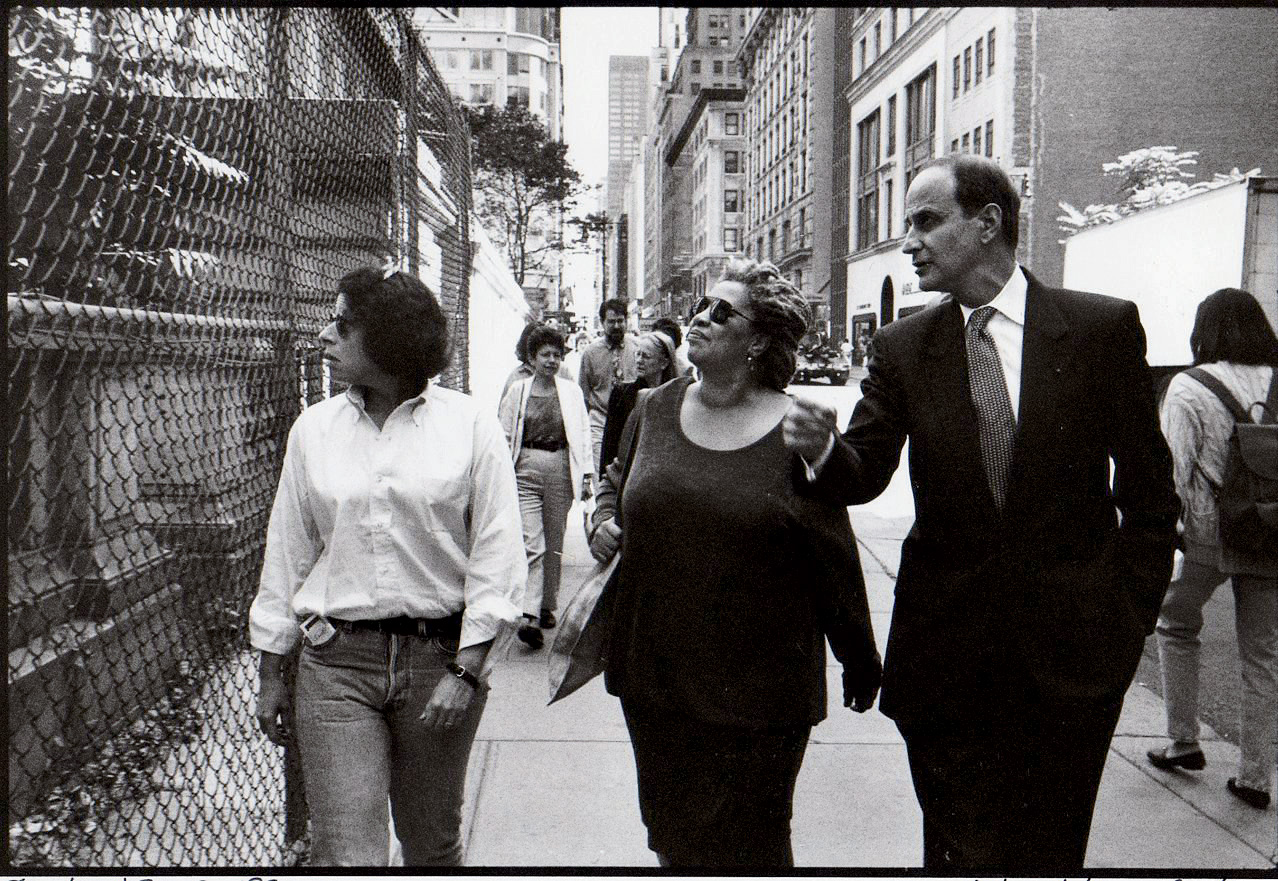
“In the early days, I used to complain bitterly because white feminists were always having very important meetings, but they were leaving their maids behind!” — Toni Morrison
———
BOLLEN: The book starts out in Seattle. To be honest, I guess I always think of segregation and race problems as a North-versus-South divide. I never really thought of the discrimination in the Pacific Northwest.
MORRISON: My editor questioned that, too. I did my research. Boeing owned all of that property that’s mentioned in the book. There were documents that said, “No Hebraic, Asiatic, Afric, whatever, can rent or buy. They can’t live here unless they work as domestics.” My editor said, “I didn’t know that. We Northerners think of that as always being in the South.” I said, “What do you mean, ‘We Northerners?’ I’m a Northerner.” He said, “Well, I guess I mean, ‘We white Northerners.’” Because there is custom—not law, but custom. And then my editor said something about the main character being black, and I said, “How do you know he’s black?” He said, “I just know.” I said, “How? ’Cause I never said it. I never wrote it. I only describe what’s going on. You can’t go in this bathroom…” Everything is viewed through a screen. The character just deals with the situation and takes it for granted. He’s not staging a march because he can’t go into a bathroom.
BOLLEN: We have a tendency to romanticize the stability of the ’50s in the same way that we romanticize the upheaval of the ’60s. You’ve spoken out about how a certain consumer-friendly, drug-induced version of the ’60s has obscured the real social changes that occurred during that decade. Was Home your attempt to rewrite the ’50s away from the favored version?
MORRISON: Somebody was hiding something—and by somebody, I mean the narrative of the country, which was so aggressively happy. Postwar, everybody was making money, and the comedies were wonderful… And I kept thinking, That kind of insistence, there’s something fake about it. So I began to think about what it was like for me, my perception at that time, and then I began to realize that I didn’t know as much as I thought. The more one looks, the more that is revealed that’s not so complimentary. I guess every nation does it, but there’s an effort to clean up everything. It’s like a human life—“I want to think well of myself!” But that’s only possible when you recognize failings and the injuries that you’ve either caused or that have been caused to you. Then you can think well of yourself because you survived them, confronted them, dealt with them, whatever. But you can’t just leap into self-esteem. Every nation teaches its children to love the nation. I understand that. But that doesn’t mean you can gloss over facts. I was an editor in the school department of [publisher] L.W. Singer Co. for a year before I came to Random House. I edited 10th- to 12th-grade literature books. For Texas books, we were forbidden to say “Civil War” in the text. We had to write “war between the States.” And of course we had to take out all sorts of words that Whitman wrote. There were caveats, constantly, when you sold textbooks to Texas. And they’re still doing it, just with religion. I understand they’ve taken the word slavery out and replaced it with something to do with trade…
BOLLEN: Obviously, the interest is not to educate, it’s to reeducate.
MORRISON: Another reason for Home is that I got very interested in the idea of when a man’s relationship with a woman is pure—unsullied, not fraught. If it’s his relationship with his mother or his girlfriend or his wife or his daughter, there’s always another layer there. The only relationship I thought that would be minus that would be a brother and a sister. It could be masculine and protective without the baggage of sexuality. So the sort of Hansel and Gretel aspect really fascinated me. And his traveling back to save her would be transportation with violence all around him.
BOLLEN: Did you name it Home because of that journey back? At the start of the novel, there is a whole section about how the Money family originally lives in a small Texas town and is given 24 hours to pick up and leave their land or else they will be killed. What does home mean after that kind of exile?
MORRISON: It was a regular thing. I have an interesting book that looked at the counties that were “cleansed.” A lot were in Texas. It was like the Palestinians. They’d just say, “Go,” and if you didn’t, you’d get killed. There was a migration—a forced migration. But the naming of the book, well, I’m really awful with titles.
BOLLEN: Hold on. Your titles are great. They have a very pure, singular, uncongested sensibility. Although it’s a lot to promise when naming a novel Home.
MORRISON: When I was working on the book, I called it “Frank Money.” It was my editor who suggested the change. When I wrote Song of Solomon, I called it something else. John Gardner [novelist] made me take that title. Somebody said “Song of Solomon,” and I said, “That’s terrible!” I was up in Knopf’s offices. John Gardner was up there, and he said, “Song of Solomon, that’s a lovely title! Keep it!” I said, “You sure?” He said, “Yes!” And I said, “Okay.” Then he left, and I thought, “Why am I paying attention to him? He wrote a book called The Sunlight Dialogues. He hasn’t had a good title since the beginning of time!” [laughs] But by then, it was too late.
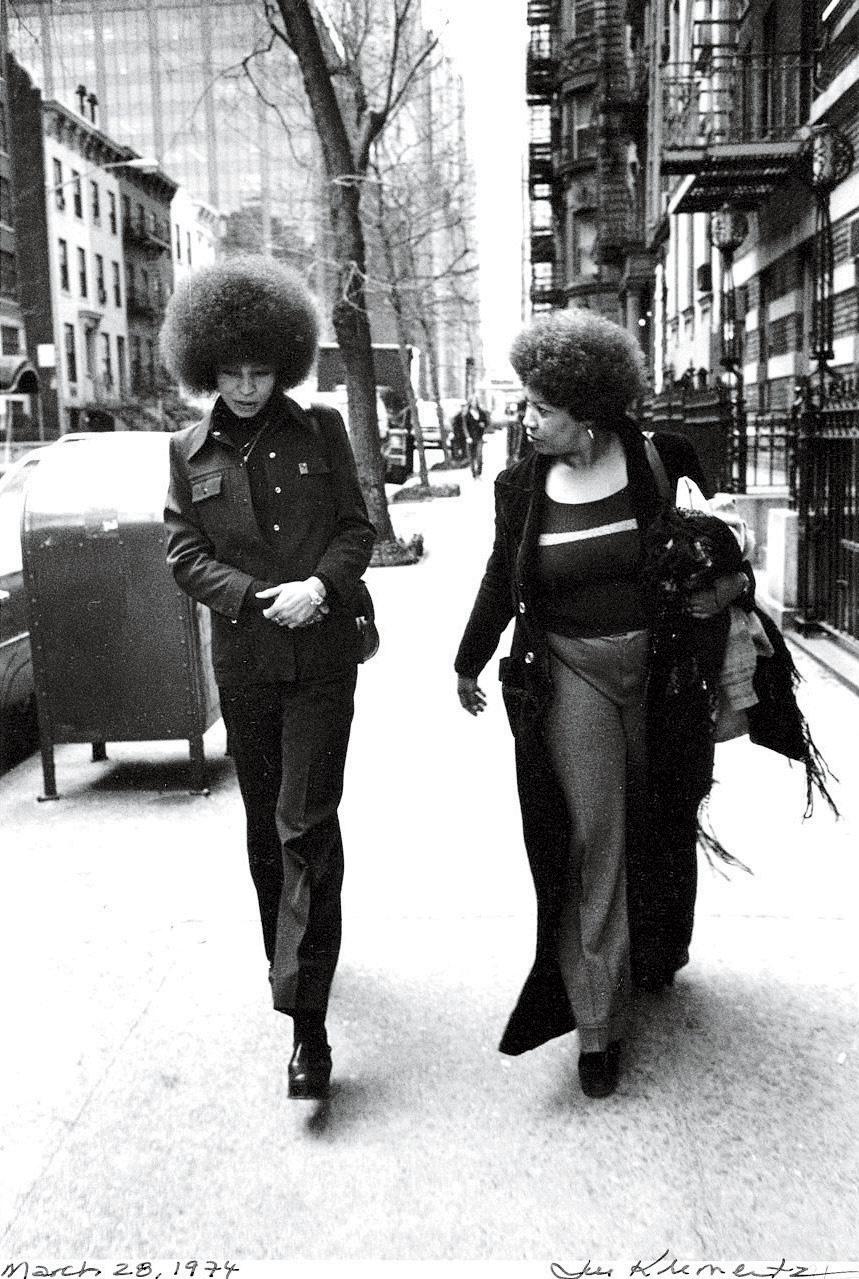
BOLLEN: In a reprint of Sula, you wrote a forward where you describe writing that book under the added pressure of raising two children and also having a full-time job at Random House. You were living in Queens. I feel like today we always glorify the young, just-plucked-from-college writer. But it’s much harder to start writing later, in middle age, struggling on a book around a full-time job and family.
MORRISON: I started at 39.
BOLLEN: Do you remember writing in those tougher circumstances as a desperate time or a liberating one in terms of waking every morning to face the blank page?
MORRISON: That was a liberation. There were two areas of total freedom for me. One has to do with my children, because they were the only ones who I knew who were not making insane demands on me. They made certain demands, but they didn’t care if I was sexy or hip, or any of those things that seem to factor in how we are judged—or at least how I was judged, as a woman in the publishing industry, by a certain kind of ambition. Other than taking rudimentary care of them, they just wanted me to be honest, and have a sense of humor, and be competent. That was simpler for me. Outside was complicated. But the writing was the real freedom, because nobody told me what to do there. That was my world and my imagination. And all my life it’s been that way, even now.
I sometimes get stuck—my son died two years ago. I stopped writing until I began to think, He would be really put out if he thought that he had caused me to stop. “Please, Mom, I’m dead, could you keep going…?” So when I got to that point, I could finish Home. But it’s not just liberating. It’s an education for me. In Home, I wrote from a man’s point of view. I had never really done that seriously until Song of Solomon. I thought, “What are they really like? What do they really think?” My father had died shortly before, and I remember saying, “I wonder what he knew.” And then I just felt relief, that, at some point, I would know, because I’d asked the right questions of him, and that it would come. And in fact it did. I’ll tell you what helped: black male writers write about what’s important to them or their lives, and what is important to them is the oppressor, the white man, because he’s the one making life complicated. Then I noticed that black women never do that. In the ’20s, they did, but I mean contemporary—and I wasn’t interested in it. Suddenly if you took the gaze of the white male—or even the white female, but certainly the male—out of the world, it was freedom! You could think anything, go anywhere, imagine anything… There was no longer the problem of looking through the master’s gaze. With that gaze, you’re always reacting, proving something. So not having to do that… I think one of the reasons I’m so thrilled with writing is because it is an act of reading for me at the same time, which is why my revisions are so sustained. Because I’m reading it. I’m there. Intimacy is extremely important to me and I want it to be extremely important to the readers, too.
BOLLEN: You’ve described your refusal to write a book that comfortably lets in the white male reader as not providing a “lobby” to your books. What freedom not to be writing and measuring what you write as worthy or marketable or entertaining for a mainstream white audience. It must have been doubly bold because you risked not being published.
MORRISON: Publishing was not on my mind. Long before I was living in Queens, I was teaching down in Washington and was surrounded by some serious writers and poets. They had a little group, and we met once a month and read our stuff. I brought old things I’d written and they would comment. But they wouldn’t let you come if you didn’t have something to read. I didn’t have anything else, so I wrote this little story about a black girl who wanted blue eyes, which is based on an incident that I had witnessed as a kid. And they talked about it, and I liked writing it, and they had such good food at these little meetings! But then I put it aside. Then I came to Syracuse. My younger son was just six months old, and I began to write and add to that story before they got up and after they went to bed just as something to do.
BOLLEN: You famously wake up before dawn to write.
MORRISON: I’m very smart in the morning. And also, those are sort of farmer’s hours. I like to be up just before the sun. Anyway, after I finished The Bluest Eye, I had sent it out to a number of people, and I got mostly postcards saying, “We pass.” But I got one letter—somebody took it seriously and wrote a rejection letter. The editor was a woman. She said something nice about the language. And then she said, “But it has no beginning, it has no middle, and it has no end.” And I just thought, She’s wrong. But the thrill was having done it. And then [writer] Claude Brown recommended somebody to me at Holt, Rinehart, and Winston. But this was back in the day of the “screw whitey” books. One of the aggressive themes of the “screw whitey” movement was “black is beautiful.” I just thought, “What is that about? Who are they talking to? Me? You’re going to tell me I’m beautiful?” And I thought, “Wait a minute. Before the guys get on the my-beautiful-black-queen wagon, let me tell you what it used to be like before you started that!” [laughs] You know, what racism does is create self-loathing, and it hurts. It can ruin you.
BOLLEN: So by telling the story of a girl who wants blue eyes and thinks she’s ugly, your first novel was really out of step with the whole “black is beautiful” program. Does that mean some of your earliest critics were from the black community?
MORRISON: Yeah, they hated it. The nicest thing I ever heard wasn’t from a critic, it was from a student who said, “I liked The Bluest Eye, but I was really mad at you for writing it.” And I said, “Why?” And she said, “Because now they will know.” But most of them were dismissive. I thought that in that milieu, nobody was going to read this. Twelve-hundred copies they printed, 1,500. I thought it would be 400. Bantam bought the paperback. It was a throw-away book. And then something extraordinary happened. I think it was City College. The book was published in ’70, and City College decided that the curriculum for every entering freshman would have to include books by women and books by African Americans, and I was on that list. That meant not just for that class, but many classes thereafter!
BOLLEN: You’ve been called “the national novelist.” You’ve also been called “the conscience of America.” In fact, it’s hard to think of another writer, except for Walt Whitman, who has been asked to stand for so much of the national voice. Do you ever feel that distracts you from your own writing? That such extreme success is, in a way, a pigeonhole?
MORRISON: I had a little moment of difficulty after I won the Nobel Prize, but I was already writing Paradise [1997], thank god. I didn’t have to invent something worthy of the prize. Now I just take the good stuff. I remember a grudge, but I take the good stuff. [laughs]
BOLLEN: There’s the romantic vision of the Nobel committee waking American recipients from their early morning sleep with a phone call. Did that happen to you?
MORRISON: No, they changed it. They’re much more civilized about it. They announce it when they have figured it out, which is in the middle of the night. So it gets out. But they have decided not to make people crazy and call them up at night, and just do it at a normal time for whatever country they’re in. What happened was a friend of mine, Ruth Simmons, who is now president of Brown, she was still at Princeton then, called me up at about seven o’clock in the morning and said, “You won the Nobel Prize.” And I thought, What? I thought she was seeing things.
BOLLEN: Did you even know you were in the running?
MORRISON: I really never thought about it. So I hung up on her! I said, “What is she talking about?” Because I thought, How would she know something that I wouldn’t know? She called me right back and said, “What’s the matter with you?” I said, “Where’d you hear that?” And she said, “I heard it from Bryant Gumbel on the Today show.” So then I had to think, Well… Maybe? But there had been so many moments—as I later learned, more than I thought—when people believed they were going to get it, and journalists were beginning to circle, and they didn’t get it.
BOLLEN: I think that happened to poor Norman Mailer. Friends even told him that he got it and he might have given an interview. But he never received it.
MORRISON: I know. It happened to Joyce Carol Oates once! The journalists were out waiting for her. But I didn’t know what to do! I just went to class, right? And then that afternoon, around 12:30, I got a telephone call from the Swedish Academy saying that I had won—at a reasonable time of day. I still wasn’t quite certain. I said, “Would you fax that?”
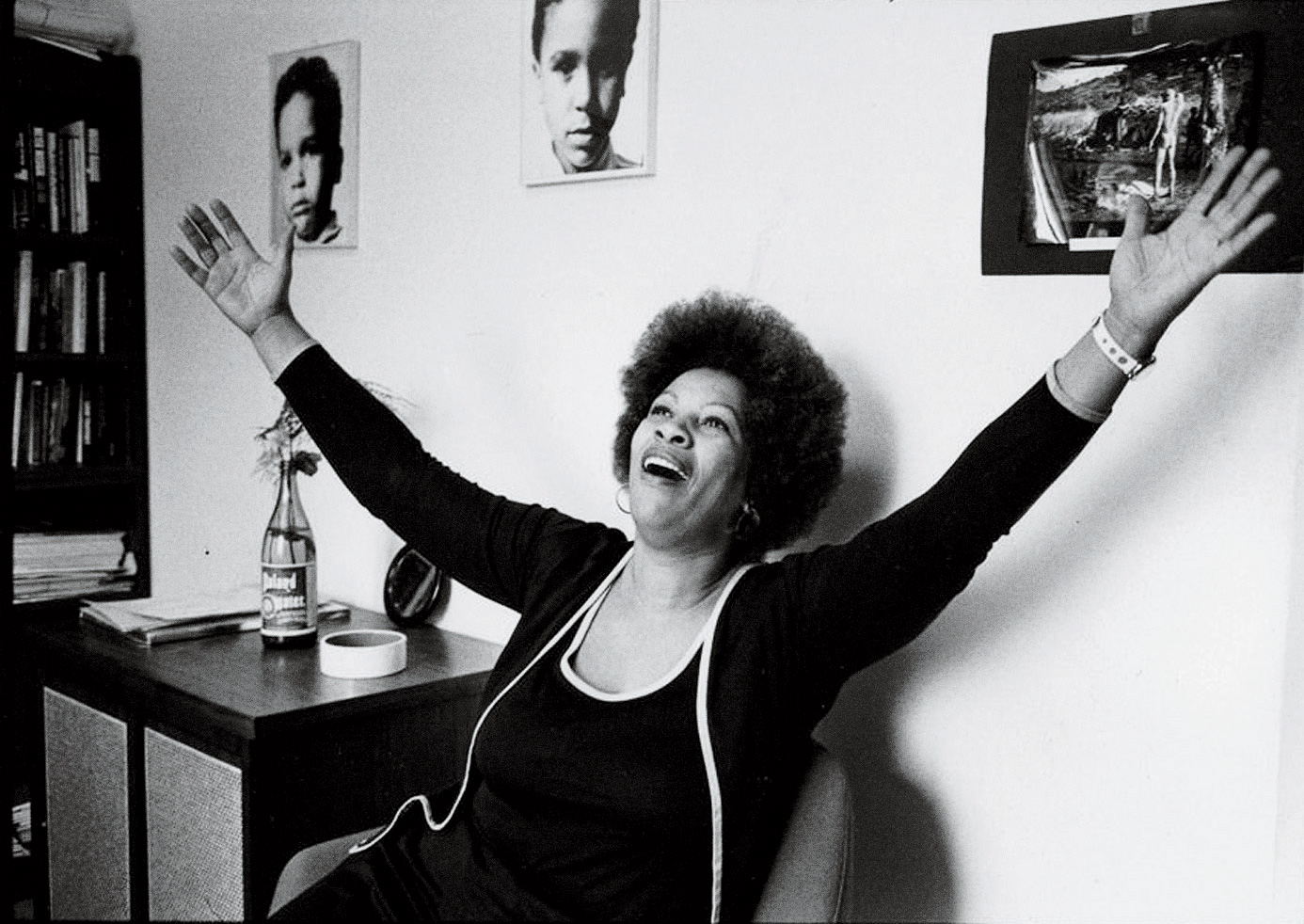
BOLLEN: You wanted it in writing! [laughs]
MORRISON: That’s right! But the event itself was just heaven. It’s the best party.
BOLLEN: I saw the recent Fran Lebowitz documentary, Public Speaking, by Martin Scorsese, where she talks about going with you and being forced to sit at the kids table.
MORRISON: [laughs] I know! She was serious. But it was really lovely. It was palatial and grand… And a little inconvenient.
BOLLEN: Is it?
MORRISON: I mean, the risers on the stairs—they were so short—I could barely walk down them. But anyway, I thought it was the best time. It was so much fun. Fran said the right thing to me, she said, “This is the first time I’ve seen pomp with circumstance.”
BOLLEN: When you finally quit your editing job to concentrate on writing in 1983, was that a moment where you thought, Okay, no going back?
MORRISON: That was different, because I sat out there on that porch when I quit [Morrison points out the window to her porch over the Hudson River]. It wasn’t as lovely as it is now because the storm knocked it down and I had to have it redone. But I was sitting out there, and I felt afraid, or something jittery. I didn’t have a job. Still with kids. It was a strange sort of feeling. And then I thought, No, what I’m feeling is not anxiety—this is happiness!
BOLLEN: Relief.
MORRISON: More than relief. I was really happy. Which is to say I guess I hadn’t been. I hadn’t felt that—it must have been a combination of happiness and something else. And it was then that I wrote Beloved. It was all like a flood when I wrote that book.
BOLLEN: How did you find that article about Margaret Garner [the escaped slave who killed her daughter in Cincinnati to avoid her daughter’s reenslavement upon capture], which became the basis for the story of Beloved?
MORRISON: I was doing The Black Book [1974 nonfiction book by Middleton A. Harris and Morrison], and these guys were bringing me all this stuff because I was going to make a whole-earth catalog about black history—the good and the bad. I got old newspapers from a guy who collected them, and I found an article about Margaret Garner. What was interesting to me was that the reporter was really quite shocked that Margaret Garner was not crazy. He kept saying, “She’s so calm… and she says she’d do it again.” So I decided to look into this. It was not uncommon for slave women to do that, but I thought, Suppose she was rational and there was a reason. This was also at a time when feminists were very serious and aggressive about not being told that they had to have children. Part of liberation was not being forced into motherhood. Freedom was not having children, and I thought that, for this woman, it was just the opposite. Freedom for her was having children and being able to control them in some way—that they weren’t cubs that somebody could just buy. So, again, it was just the opposite of what was the contemporary theme at the moment. Those differences were not just about slavery or black and white—although there was some of that—but in the early days, I used to complain bitterly because white feminists were always having very important meetings, but they were leaving their maids behind! [laughs]
BOLLEN: Did you feel a real split between white and black feminists?
MORRISON: Womanists is what black feminists used to call themselves. Very much so. They were not the same thing. And also the relationship with men. Historically, black women have always sheltered their men because they were out there, and they were the ones that were most likely to be killed. As a matter of fact, this was an interesting thing for me. When I went into the publishing industry, many women talked about the difficulty they had in persuading their families to let them go to college. They educated the boys, and the girls had to struggle. It was just the opposite in the African-American communities, where you educated the girls and not the boys, because the girls could always go into nurturing professions—teachers, nurses… But if you educated your men, they would go into jobs where they would have to be confronted or held down. They could never flourish so easily. Now that has changed in any number of ways, but it was like an organism protecting itself.
BOLLEN: In Home, there’s the zoot-suited man that haunts the narrative and appears before the main character a few times. How did he enter the novel?
MORRISON: Well, a lot of the book confronts the question of how to be a man, which is really how to be a human, but let’s say “man.” And he’s struggling with that, and there’s certain pro forma ways in which you can prove you’re a man. War is one. But the zoot-suit guys, postwar, in the late ’40s, early ’50s, they were outrageous—they were asserting a kind of maleness, and it agitated people. The police used to shoot them. You talk about dress, not to speak of hoodies—they were always arresting those guys. I wanted this figure of a fashion-statement male to just hover there.
BOLLEN: You bring up hoodies. Is there a link between what happened then to what is happening today with the Trayvon Martin case? There was the Million Hoodie March. Do you think situations like Trayvon Martin’s shooting still happen all of the time and they just aren’t reported? Or have we curtailed the systematic murder of black men in America?
MORRISON: The hoodie is just a distraction. I thought they should have had a Million Doctors March or something like that! For me, it’s highly theatricalized now, very theatricalized in the media. The killing of young black men has never changed all that much, with or without hoodies. I don’t know of any young black men who haven’t been stopped by cops. Ever. My sons… I was listening to Jesse Jackson talk about his sons—one was in law school and one was in business school. But they were all stopped. I remember Cornel West telling me he was teaching somewhere and he had to commute. He was stopped every time. It doesn’t matter if the car is new or beat up—Cornel’s was beat up, they still stopped him. [laughs] So the pervasive notion of black men as “up to no good” may be spoken about more right now in the media, but it’s no less pervasive than it’s always been. It’s like my character Frank Money in Home. I just took it for granted that the police would search him on the street. But I’m interested in what the consequences of this situation will be for any number of reasons. There are two things I want to know, and I may spend some time doing research. One is, has any white man in the history of the world ever been convicted of raping a black woman? Ever?
BOLLEN: I can’t think of one offhand.
MORRISON: I just want one. The other thing is, has any cop shot a white kid in the back? Ever? I don’t know of any. Those are two things I’m looking for. And then I will believe all this stuff. Once I find a cop who shoots a young white kid for being in the wrong place at the wrong time.
BOLLEN: That never seems to happen, does it? Back in 2008, when Barack Obama was running for office, he asked you for an endorsement, which you eventually gave. You said having him in the office would be a restitution. You called it a necessary evolution and not a revolution.
MORRISON: Did I say that? It sounds good! [laughs]
BOLLEN: You did. Now, on the eve of his reelection, do you think Obama fulfilled those expectations?
MORRISON: More. More. He’s better than I thought he would be.
BOLLEN: I feel that way overall. There are moments where I’ve had some doubts, but it’s natural to lose confidence with a president at certain points in a presidency.
MORRISON: Of course, but what I didn’t expect was the amount of hostility. I knew there would be some—maybe even lots—but this is really deranged. For the people who hate Obama, it doesn’t matter what he does. Nothing matters. And the things they say are so retro. I decided that once they have something called the n-word that no one can say, it did the opposite of the word like. Taking the n-word—N-I-G-G-E-R—out of language left a hole. So now there is this flood of other words—Kenyan and no-births—that they have produced in order to fill that hole. The n-word used to say it all. Now there’s this other loaded vocabulary that’s become totally insane. It’s the opposite of like. As in, “I’m, like, ‘Wow…’” Or, “It was, like…” Or, “I’m thinking, like…” Like has taken 90 words out of the vocabulary. They don’t say felt any more. And I get really upset about that. So there’s a word that erases language, and then there’s the erasure of a word that produces a deranged kind of language. That’s startling to me. And the response from the people who dislike Obama is a really visceral dislike. I read a sentence in a newspaper article that said, “The real problem is that here’s a black man in charge of the world.” It’s not a judge or a doctor or the head of a neighborhood—it’s the world. Some people aren’t able to deal with that.

